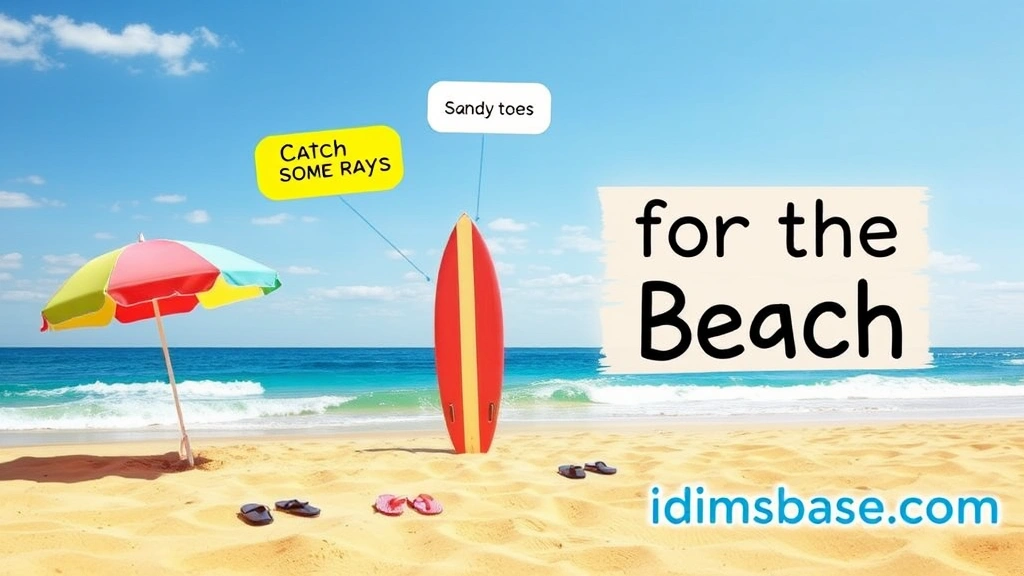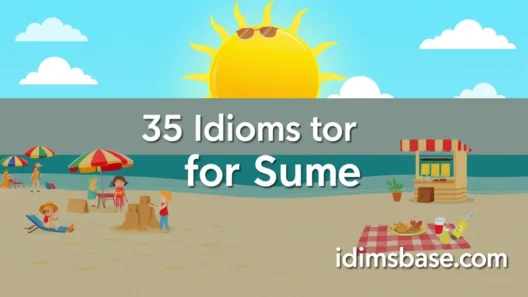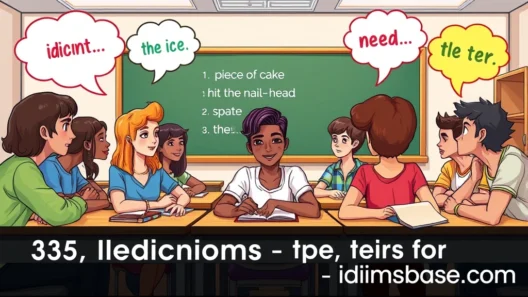Are you ready to dive into the wonderful world of beach idioms? Imagine this: you're strolling along the sun-kissed shore, the waves gently lapping at your feet, and suddenly, you hear someone say, "That's just a drop in the ocean!" You might think, "Wait, are we talking about the actual ocean, or something else?" Well, my friend, you've just encountered the magic of idioms!
Idioms are those quirky, colorful phrases that don't quite mean what their individual words suggest. They add so much flavor and fun to our everyday conversations, making language vibrant and exciting. And what better inspiration for these linguistic gems than the beach – a place of relaxation, adventure, and endless possibilities?
So, grab your imaginary beach towel, slather on some virtual sunscreen, and let's explore 35 fantastic idioms inspired by the glorious beach! Get ready to impress your friends, enrich your vocabulary, and perhaps even understand a few more movie lines!
Splashing Into Beach Idioms: Your Ultimate Guide
Let's break down these brilliant beach-themed expressions. From sandy shores to deep blue seas, these idioms will make you feel like a true language connoisseur!
Idioms About the Ocean and Waves
The ocean is vast and mysterious, just like these idioms!
- A drop in the ocean: This means a very small amount compared to what is needed or expected. Think of how tiny one drop of water is in the whole ocean!
- Example: "My savings for a new car feel like a drop in the ocean compared to the price."
- Make waves: To cause a disturbance or create a significant impression.
- Example: "Her innovative idea really made waves in the business community."
- Ride the wave: To take advantage of a successful trend or situation.
- Example: "They rode the wave of popular demand for eco-friendly products."
- The tide is turning: This suggests a change in circumstances or opinion, often for the better.
- Example: "After a tough start, the tide is turning for our team."
- Go with the flow: To adapt to circumstances rather than resisting them.
- Example: "Sometimes it's best to just go with the flow and see where life takes you."
- Against the tide: To do something that goes against the popular opinion or trend.
- Example: "He decided to pursue art against the tide of his family's expectations for a corporate career."
- Lost at sea: Feeling confused, bewildered, or unsure of what to do.
- Example: "After the unexpected news, she felt completely lost at sea."
- In deep water: To be in a serious or difficult situation.
- Example: "He found himself in deep water after missing several deadlines."
- Keep your head above water: To manage to survive or cope with difficulties, especially financially.
- Example: "With rising costs, it's hard to keep your head above water these days."
- Test the waters: To try out a new situation or idea cautiously before committing fully.
- Example: "Before launching the new product, they decided to test the waters with a small focus group."
- Sail through something: To easily succeed at something without much difficulty.
- Example: "She sailed through her exams thanks to all her hard work."
- Smooth sailing: A situation where everything is going well without problems.
- Example: "After the initial challenges, it was smooth sailing for the rest of the project."
Idioms About Sand and Shores
The beach isn't just about water; the sand and shore have their own stories to tell!

- Bury your head in the sand: To ignore a problem or an unpleasant situation, hoping it will go away.
- Example: "You can't just bury your head in the sand; you need to address the issue."
- Leave footprints in the sands of time: To leave a lasting and significant impact on history or on people's lives.
- Example: "Great leaders strive to leave footprints in the sands of time."
- A grain of sand: A very small, insignificant part of something much larger.
- Example: "My contribution felt like a grain of sand in the massive effort."
- Build castles in the air/sand: To have unrealistic dreams or plans that are unlikely to come true.
- Example: "He's always building castles in the air about winning the lottery."
- Clutching at straws: Desperately trying to find a solution or hope in a hopeless situation.
- Example: "He was clutching at straws, trying to find any reason to delay the decision."
- Shore up: To strengthen or support something that is weak or about to fail.
- Example: "They needed to shore up their defenses before the big game."
Idioms About Beach Life and Leisure
Ah, the relaxed vibe of the beach! These idioms capture that leisurely spirit.
- Beach bum: Someone who spends a lot of time at the beach, often avoiding work or responsibilities.
- Example: "After retirement, he became a total beach bum, enjoying life by the ocean."
- Sun-kissed: Having skin that is tanned and slightly reddened by the sun.
- Example: "Her sun-kissed hair shone brightly in the afternoon light."
- Catch some rays: To spend time in the sun, especially to get a tan.
- Example: "I'm heading to the park to catch some rays this afternoon."
- Make hay while the sun shines: To make the most of an opportunity while it lasts.
- Example: "The market is booming, so we need to make hay while the sun shines."
- A breath of fresh air: Something or someone new and refreshing, often bringing positive change.
- Example: "Her innovative approach was a real breath of fresh air for the team."
- Clear as a bell: Very clear and easy to understand.
- Example: "Her instructions were clear as a bell, so everyone knew what to do."
- Soak up the sun: To enjoy the sun and its warmth.
- Example: "We spent the whole day soaking up the sun on the beach."
- Take a dip: To go for a quick swim.
- Example: "It's so hot, I think I'll take a dip in the pool."
- Life's a beach: A humorous way of saying that life is difficult or unpleasant, often used sarcastically.
- Example: "My car broke down and then I spilled coffee on my shirt. Oh well, life's a beach!"
- Beyond the pale: Unacceptable or outside the bounds of what is considered normal or right.
- Example: "His comments were completely beyond the pale." (This one sometimes relates to boundaries, like a fence or 'pale' which can be like a boundary line, linking to the idea of a defined area much like a beach has boundaries).
Broader Water-Related Idioms (Still Beachy Vibes!)
These might not be exclusively beach-bound, but they definitely fit the watery theme!
- Come hell or high water: No matter what difficulties arise.
- Example: "We'll finish this project by Friday, come hell or high water."
- Water under the bridge: Past events or issues that are no longer important or worth worrying about.
- Example: "Their old argument is just water under the bridge now."
- Pour oil on troubled waters: To calm a difficult or tense situation.
- Example: "The manager tried to pour oil on troubled waters during the heated meeting."
- Like a fish out of water: Feeling uncomfortable or out of place in a situation.
- Example: "At the formal dinner, I felt like a fish out of water."
- There are plenty of fish in the sea: There are many other opportunities or suitable people available.
- Example: "Don't worry about that one job rejection; there are plenty of fish in the sea!"
- To be out of your depth: To be involved in a situation that is too difficult for you to handle.
- Example: "He was out of his depth trying to manage such a large team."
- The tip of the iceberg: Only a small, visible part of a much larger, often hidden, problem or situation.
- Example: "The problems we're seeing now are just the tip of the iceberg."
Frequently Asked Questions About Idioms

You've got questions, and we've got answers! Let's clear up any lingering curiosities about these fascinating phrases.
Q1: What exactly is an idiom?
An idiom is a phrase or expression whose meaning cannot be understood from the ordinary meanings of its individual words. It's a figurative saying, meaning it doesn't mean literally what it says. For example, "kick the bucket" doesn't mean to literally kick a bucket; it means to die.
Q2: Why are idioms so important in language?
Idioms are super important for several reasons! First, they add richness and color to language, making conversations more interesting and vivid. Second, understanding idioms is crucial for truly grasping a language, especially when listening to native speakers or watching movies and TV shows. They reflect cultural nuances and historical contexts, too. Plus, using them correctly can make you sound more like a native speaker!
Q3: How can I learn and remember new idioms effectively?
Great question! Here are a few tips:
- Context is key: Always try to learn idioms in context, not just as isolated phrases. Read them in sentences, stories, or articles.
- Visualize: Try to create a mental image of the idiom, even if it's silly. For "bury your head in the sand," imagine an ostrich!
- Practice using them: The best way to remember is to use them! Try to incorporate new idioms into your conversations or writing.
- Keep a notebook: Jot down new idioms you encounter, along with their meanings and an example sentence.
- Watch and listen: Pay attention to how native speakers use idioms in movies, TV shows, podcasts, and daily conversations.
Q4: Are idioms the same as proverbs or slang?
Not quite! While they all add flavor to language, there are differences:
- Idioms: Figurative phrases where the meaning isn't obvious from the words (e.g., "spill the beans").
- Proverbs: Short, well-known sayings that express a general truth or piece of advice (e.g., "Actions speak louder than words"). They often have a moral lesson.
- Slang: Informal words or phrases that are often specific to a particular group or time period and may not be widely understood or accepted in formal settings (e.g., "chill out," "lit").
While there can be some overlap, their primary functions and characteristics differ.
Q5: Can using idioms make my English sound more natural?
Absolutely! Using idioms naturally and correctly is a strong indicator of fluency and can make your English sound much more authentic and less robotic. It shows you're not just translating word-for-word but truly understanding the nuances of the language. Just be careful not to overuse them or use them incorrectly, as that can sound unnatural too!
Key Takeaways
Wow, what a journey through the world of beach-inspired idioms! Here are the golden nuggets to remember:
- Idioms are fun and functional: They add color, express complex ideas concisely, and are essential for understanding native speakers.
- The beach is a treasure trove of expressions: From the vastness of the ocean to the simple grain of sand, the beach provides endless inspiration for vivid language.
- Context is king: Always pay attention to how idioms are used in sentences to truly grasp their meaning.
- Practice makes perfect: The more you expose yourself to and use idioms, the more natural they will become.
- Don't be afraid to test the waters: Try incorporating these new phrases into your vocabulary. You'll be making waves in no time!
So, the next time you're at the beach, or even just dreaming of it, remember these fantastic idioms. They're not just words; they're little linguistic adventures waiting to be explored. Keep soaking up that knowledge, and your English will be clear as a bell!







